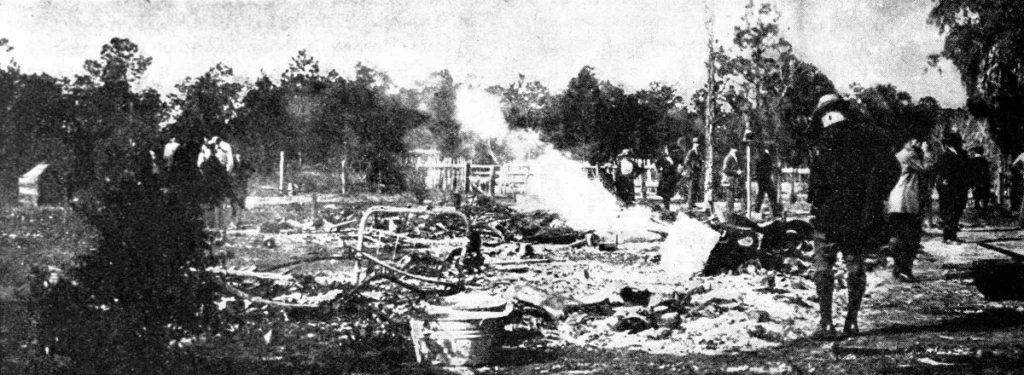Tragic Rosewood massacre to be commemorated in January 2023

Florida is set to start the year 2023 with a remembrance of the horrific massacre at Rosewood.
This January will mark 100 years since the small Black community of Rosewood in north Florida was burned to the ground after a mob of white vigilantes came to town, looking to avenge the reported rape of a white woman.
Fannie Taylor was the name of that white woman; she lived in the nearby mostly white settlement of Sumner. When she told her neighbors that a Black man, Jesse Hunter, had assaulted her in her home it caused outrage. Sumner’s whites turned on Rosewood, a nearby unincorporated community where Blacks owned their land and homes, had local businesses, a school, three churches and a Masonic lodge. From January 1-7, 1923, hundreds of whites and local county officials came looking for Hunter. In that week the white mob looted livestock and property; shot, hung and murdered residents; and burned Rosewood to the ground. It was an event covered in national media by papers like The New York Times and the Gainesville Daily Sun––most of the reportage was from Associated Press stringers. Rosewood residents had fled into nearby swamps, hid in wells, and escaped by foot to get out of the area: some were placed on a train by helpful local whites. Officially, two white men and four Blacks were killed but others contend that the number of dead ranged between 27 and 100.
When Rosewood burned, residents lost everything but were not compensated for their losses. For 60 years, Rosewood’s survivors did not speak about the massacre. After media coverage about the incident picked up again in the 1980s, survivors came forward in 1994 to file a claims bill in the Florida legislature. On May 4, 1994, Gov. Lawton Chiles signed a $2.1 million compensation bill that gave a total of nine survivors $150,000 each, plus a state university scholarship fund for Rosewood families and their descendants.
“The survivors, who were, of course, all elderly, got a chance to tell their story,” said Maxine D. Jones, professor of history and director of the Women Studies Program at Florida State University. Dr. Jones was the lead investigator for the report “documented history of the incident which occurred at Rosewood, Florida, in January 1923” which was commissioned by the state of Florida. “I think that was important because this had been buried. It was a secret, even within the families. They really didn’t talk about it.”
The $150,000 given to survivors was not a lot of money, Jones acknowledged. “But no amount of money could make up for what happened. Lives have been, you know, destroyed. Legacies have been lost. And to be honest, there is more than one way to die. I think spiritually, we talk about, you know, generational trauma. I’m sure how the descendants raised their children can probably be traced back to some of the trauma that they themselves experienced. So sometimes you can’t put a price on something.
“But the state of Florida did acknowledge that it had failed in its efforts to protect all of its citizens and it did make an attempt to compensate them for that. Now the money that was awarded was just a drop in the bucket to what the families originally asked for. I mean, it was in the millions of dollars, and then it was reduced to $7.2 million and then I think that they appropriated $2.1 million and gave the $150,000 to the survivors. It also provided for scholarships for descendants of the Rosewood families, but again I think getting their story out there was important and I think the governor, in the state of Florida, acknowledging what had happened was huge. This is probably the first time that the government, at any level, has acknowledged something like that since the Japanese internment. So that part was huge, and I also think that Rosewood encourages other people to tell their stories as well.”
The story of the Rosewood massacre is the kind of history that, ironically, Florida’s current governor does not want to be taught to the state’s students. Florida Gov. Ron DeSantis has promoted a Stop W.O.K.E Act, which prohibits any teaching that could make students feel they bear personal responsibility for historic wrongs.
The state of Florida is, as of this writing, not planning a commemoration of the Rosewood centennial. The University of Florida is hosting the remembrance activities and events that will kick off on Jan. 7, 2023. They feature a wreath-laying ceremony presided over by descendants of the eight surviving families, screenings of the John Singleton-directed 1997 film “Rosewood,” and panel discussions that examine the importance of maintaining communities in the past and in the present. The governor and his staff have been encouraged to attend the activities but have not yet responded to their invitation.
“Varying history doesn’t help any of us,” Jones commented. “I think it helps us to understand why there is sometimes tension between, you know, various groups. I think that Black people have a right to know their history, how they’ve been treated. The history is there, and it should be made available to anyone who is interested. But imagine you are a descendant of the Rosewood families and you’ve been denied a part of your history. I mean, I can’t control how people feel, I don’t have an agenda: I’m just presenting the facts. My intent is not to make anyone feel guilty, but this is our history. How can you not acknowledge it? How can you walk away from it and pretend that it never happened? …You cannot sweep it under the rug: the intent is to inform.”








